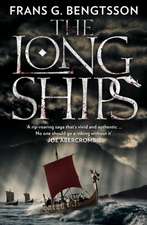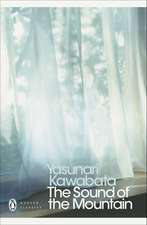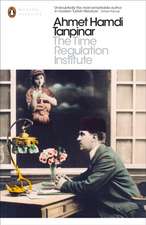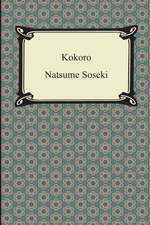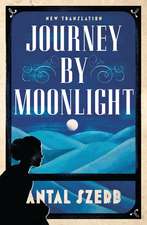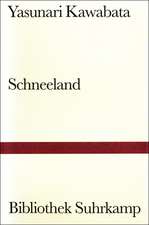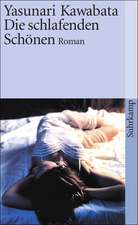Thousand Cranes: Penguin Archive
Autor Yasunari Kawabata Traducere de Edward G. Seidenstickeren Limba Engleză Paperback – 17 apr 2025
While attending a traditional tea ceremony in the aftermath of his parents’ deaths, Kikuji encounters his father’s former mistress, Mrs. Ota. At first Kikuji is appalled by her indelicate nature, but it is not long before he succumbs to passion—a passion with tragic and unforeseen consequences, not just for the two lovers, but also for Mrs. Ota’s daughter, to whom Kikuji’s attachments soon extend. Death, jealousy, and attraction convene around the delicate art of the tea ceremony, where every gesture is imbued with profound meaning.
| Toate formatele și edițiile | Preț | Express |
|---|---|---|
| Paperback (2) | 62.00 lei 3-5 săpt. | +3.62 lei 4-10 zile |
| Penguin Books – 5 ian 2011 | 62.00 lei 3-5 săpt. | +3.62 lei 4-10 zile |
| Vintage Publishing – 31 oct 1996 | 82.08 lei 3-5 săpt. |
Din seria Penguin Archive
-
 Preț: 38.29 lei
Preț: 38.29 lei -
 Preț: 38.29 lei
Preț: 38.29 lei -
 Preț: 38.29 lei
Preț: 38.29 lei -
 Preț: 38.29 lei
Preț: 38.29 lei -
 Preț: 38.29 lei
Preț: 38.29 lei -
 Preț: 38.29 lei
Preț: 38.29 lei -
 Preț: 38.29 lei
Preț: 38.29 lei -
 Preț: 38.29 lei
Preț: 38.29 lei -
 Preț: 38.86 lei
Preț: 38.86 lei -
 Preț: 38.29 lei
Preț: 38.29 lei -
 Preț: 38.29 lei
Preț: 38.29 lei -
 Preț: 38.86 lei
Preț: 38.86 lei -
 Preț: 38.29 lei
Preț: 38.29 lei -
 Preț: 38.86 lei
Preț: 38.86 lei -
 Preț: 38.29 lei
Preț: 38.29 lei -
 Preț: 38.29 lei
Preț: 38.29 lei -
 Preț: 38.29 lei
Preț: 38.29 lei -
 Preț: 38.86 lei
Preț: 38.86 lei -
 Preț: 38.29 lei
Preț: 38.29 lei -
 Preț: 38.29 lei
Preț: 38.29 lei -
 Preț: 38.29 lei
Preț: 38.29 lei -
 Preț: 38.86 lei
Preț: 38.86 lei -
 Preț: 38.29 lei
Preț: 38.29 lei -
 Preț: 38.86 lei
Preț: 38.86 lei -
 Preț: 38.29 lei
Preț: 38.29 lei -
 Preț: 38.29 lei
Preț: 38.29 lei -
 Preț: 38.86 lei
Preț: 38.86 lei -
 Preț: 38.29 lei
Preț: 38.29 lei -
 Preț: 38.86 lei
Preț: 38.86 lei -
 Preț: 38.29 lei
Preț: 38.29 lei -
 Preț: 38.86 lei
Preț: 38.86 lei -
 Preț: 38.29 lei
Preț: 38.29 lei -
 Preț: 38.86 lei
Preț: 38.86 lei -
 Preț: 38.29 lei
Preț: 38.29 lei -
 Preț: 38.29 lei
Preț: 38.29 lei -
 Preț: 38.29 lei
Preț: 38.29 lei -
 Preț: 38.86 lei
Preț: 38.86 lei -
 Preț: 38.29 lei
Preț: 38.29 lei -
 Preț: 38.29 lei
Preț: 38.29 lei -
 Preț: 38.29 lei
Preț: 38.29 lei -
 Preț: 38.86 lei
Preț: 38.86 lei -
 Preț: 38.29 lei
Preț: 38.29 lei -
 Preț: 38.29 lei
Preț: 38.29 lei -
 Preț: 38.86 lei
Preț: 38.86 lei -
 Preț: 38.86 lei
Preț: 38.86 lei -
 Preț: 38.86 lei
Preț: 38.86 lei -
 Preț: 38.86 lei
Preț: 38.86 lei -
 Preț: 38.86 lei
Preț: 38.86 lei -
 Preț: 38.29 lei
Preț: 38.29 lei
Preț: 38.86 lei
Nou
Puncte Express: 58
Preț estimativ în valută:
7.44€ • 7.74$ • 6.14£
7.44€ • 7.74$ • 6.14£
Carte nepublicată încă
Doresc să fiu notificat când acest titlu va fi disponibil:
Se trimite...
Preluare comenzi: 021 569.72.76
Specificații
ISBN-13: 9780241752098
ISBN-10: 0241752094
Pagini: 144
Dimensiuni: 111 x 181 x 15 mm
Greutate: 0.2 kg
Editura: Penguin Books
Colecția Penguin Classics
Seria Penguin Archive
ISBN-10: 0241752094
Pagini: 144
Dimensiuni: 111 x 181 x 15 mm
Greutate: 0.2 kg
Editura: Penguin Books
Colecția Penguin Classics
Seria Penguin Archive
Notă biografică
Yasunari
Kawabata
was
born
near
Osaka
in
1899
and
was
orphaned
at
the
age
of
two.
His
first
stories
were
published
while
he
was
still
in
high
school
and
he
decided
to
become
a
writer.
He
graduated
from
Tokyo
Imperial
University
in
1924
and
a
year
later
made
his
first
impact
on
Japanese
letters
with
Izu
Dancer.
He
soon
became
a
leading
figure
the
lyrical
school
that
offered
the
chief
challenge
to
the
proletarian
literature
of
the
late
1920s.
His
writings
combine
the
two
forms
of
the
novel
and
the
haiku
poems,
which
within
restrictions
of
a
rigid
metre
achieves
a
startling
beauty
by
its
juxtaposition
of
opposite
and
incongruous
terms.Snow
Country(1956)
andThousand
Cranes(1959)
brought
him
international
recognition.
Kawabata
died
by
his
own
hand,
on
April
16
1972.
Thousand Cranesis translated from the Japanese by Edward G. Seidensticker (1921-2007), who was a prominent scholar of Japanese literature.
Thousand Cranesis translated from the Japanese by Edward G. Seidensticker (1921-2007), who was a prominent scholar of Japanese literature.
Descriere
Descriere de la o altă ediție sau format:
Kikuji has been invited to a tea ceremony by a mistress of his dead father. He is shocked to find there the mistress's rival and successor, Mrs Ota, and that the ceremony has been awkwardly arranged for him to meet his potential future bride. But he is most shocked to be drawn into a relationship with Mrs Ota.
Kikuji has been invited to a tea ceremony by a mistress of his dead father. He is shocked to find there the mistress's rival and successor, Mrs Ota, and that the ceremony has been awkwardly arranged for him to meet his potential future bride. But he is most shocked to be drawn into a relationship with Mrs Ota.
Recenzii
“A literary habitat like no other . . . quietly devastating fiction. . . . Behind a lyrical and understated surface, chaotic passions pulse.”
—The Independent (London)
“Thousand Cranes has the qualities of the best Japanese writing: a stunning economy, delicacy of feeling, and a painter’s sensitivity to the visible world.”
—The Atlantic
—The Independent (London)
“Thousand Cranes has the qualities of the best Japanese writing: a stunning economy, delicacy of feeling, and a painter’s sensitivity to the visible world.”
—The Atlantic

